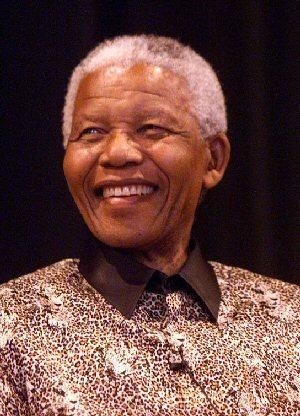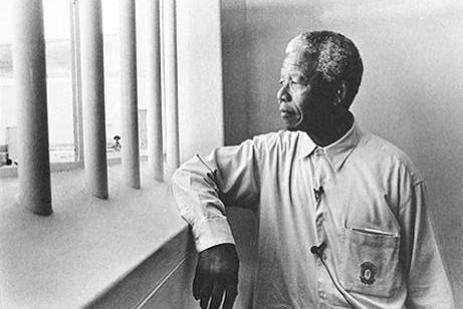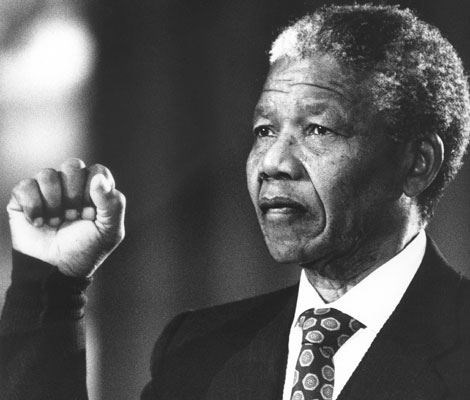 |
| ( http://www.all-inspirational.com/image-files/nelson-mandela-inspirational-quotes.jpg) |
Egalitarianism. Definition: maintaining, relating to, or based on a belief that all people are, in principle, equal and should enjoy equal social, political, and economic rights and opportunities. Synonym: equality. At times we don’t realize our rights or the equal opportunities our society has to offer. In today’s world, men and women complain about things of little or no significance; people become lost in a world of materialism, and succumb to the enticements of everyday life. One man, never diverted by these temptations, rose above all challenges in his fight for racial justice: Nelson Mandela. Mandela is considered a hero not solely because of the ethical and moral behavior he portrayed in the face of hardships, but also because of the sacrifice he made for the betterment of society in South Africa, along with being a true, natural-born leader.
Born on July 18th, 1918, in Umtata in the Transkei territory of South Africa, Nelson Rolihlahla Mandela was raised by his father, a Tembu tribal leader. He married and divorced twice: first to a nurse named Evelyn Ntoko Mase and second to a social worker and political activist named Nomzamo Winnie Madikileza. Mandela’s children are Makgatho, Makaziwe, Zenani, Zindziswa, and Thembi (deceased). Nelson Mandela studied law and became a political activist who initiated the revolution against the apartheid government (a system of enforce racial discrimination against blacks) in South Africa. He joined the African National Congress (ANC) in 1944. In 1961, he became the commander-in-chief of the Umkhonto we Sizwe (Spear of the Nation), “an organization committed to an armed struggle against apartheid” (Saunders). In 1964 he was convicted of sabotage and conspiracy and sentenced to life in prison. After his release from prison, Mandela became the first black president of South Africa. Mandela can be described as “a herd boy from an isolated mountainous area who did not wear shoes until age 16”, who “rose against overwhelming odds to be president of the richest, most culturally diverse country in Africa” ("Mandela, Nelson (1918-)." UXL Biographies).
Nelson Mandela embraces the ethics of compassion, tolerance, equality, and humility, even in the face of adversity. Mandela displayed his tolerance of other races and cultures when he “sought to assuage white fears of a black political takeover by insisting that the ANC's form of nationalism recognized the right of all South African racial groups to enjoy political freedom and nondiscrimination together in the same country” ("Overview of Nelson R. Mandela"). Despite being mistreated by whites and facing racial discrimination, Mandela tried to console others by promising equality for all in the nation. There was no sense of revenge from Mandela, but instead he wished to assist those who were against him. This truly exemplifies his open-mindedness and selflessness. Mandela has a peaceful mindset which is validated through the following quote: “Unlike the young leaders with whom he grew up, Mandela was ready to try every possible technique to destroy apartheid peacefully, though he, too, realized the futility of nonviolence in view of the conditions which prevailed in his country” (Ngubane). Mandela, a peace-loving individual tried to resolve racial tensions in a diplomatic way. He wished no harm, but when nonviolent tactics failed, only then did he use destructive methods for the reformation of South Africa. After Nelson Mandela became president of South Africa he continued to dedicate his time and effort to good causes. “Since becoming President, Mandela has worked to heal the racial divisions in South Africa; to achieve South Africa's readmittance to the world community of democratic nations; and to address the crushing poverty of the country's black citizens” ("Overview of Nelson R. Mandela."). In spite of overcoming great obstacles and becoming an influential leader, Mandela was humbled by his past and his unprivileged background. Even after achieving his goals, Mandela strived to accomplish more through his efforts in alleviating poverty and providing equity. Mandela displayed compassion in assisting the poor, and illustrated humility through reaching out to his community. All in all, even when faced with the harsh conditions of discrimination within South Africa, Mandela continued to maintain his moral values.
 |
| Mandela imprisoned (http://newsone.com/files/2010/02/nelson_mandela_return_to_cell.jpg) |
Mandela sacrificed his time and efforts to bring racial justice to South Africa. He accomplished this by working to become a politician. “Mandela gave up his right to succeed his father and instead prepared for a legal career. He took classes from the South African Native College (now the University of Fort Hare) and the University of South Africa. He received a bachelor’s degree in 1943. He then studied law at the University of Witwatersrand. In 1952, he passed the qualifying exam to practice law. That year, in Johannesburg, he and political ally Oliver Tambo opened the first black law partnership in South Africa.” (Saunders). Mandela gave up an opportunity of tribal leadership in order to pursue a career in politics. Mandela wanted to do something significant in his lifetime; he wanted to leave an indelible mark on society.
Another instance which highlights Mandela’s sacrifice, was when he was sentenced to prison for supporting his cause. “On August 4, 1962, Mandela was arrested by South African police and charged with organizing illegal demonstrations. Once again he used his courtroom appearance as an opportunity to challenge the legality of South Africa's minority rule. His defense was masterful and eloquent, but he was nevertheless convicted and sentenced to five years in prison. While he was serving this sentence, the police connected him to Spear of the Nation and charged him with the more serious crimes of treason and sabotage. After yet another trial, he was sentenced to life in prison in June of 1964” ("Mandela, Nelson (1918-)” DISCovering Biography). Even after putting together a “masterful and eloquent” defense in his trial, Nelson Mandela was imprisoned, attesting to racism at its peak. He spent twenty-seven years of his life in prison for his cause, on charges that were eventually dropped. By putting his people before himself, Mandela illustrated his altruistic and selfless character. Through these unselfish acts, Mandela proves himself worthy of hero stature.
 |
| (http://www.brisbanetimes.com.au/ffximage/2008/05/01/470x400nelson.jpg) |
Nelson Mandela’s courage, dedication, and influence demonstrate the attributes of a good leader. His skills as a leader are supported by this quote: “Mandela had long been a leader of protests against apartheid — the South African government's policy of rigid racial segregation. In 1962, he was imprisoned on charges of conspiring to overthrow the white minority government. While in prison, Mandela became a symbol of the struggle for racial justice. After his release in 1990, he led negotiations with white leaders that eventually brought an end to apartheid and established a nonracial system of government. From 1991 to 1997, Mandela served as president of the African National Congress (ANC), a group that helped win political and civil rights for the country’s blacks” (Saunders). Nelson Mandela’s dedication to his cause is makes him one of the greatest leaders of his time. After his courageous confrontation with the apartheid, and his subsequent imprisonment, Mandela persisted in attaining social and racial fairness. “Even in prison Mandela projected a natural sense of command. ‘He is, quite simply, a giant of a man with an enormous intellect,’ said Desmond Tutu…At several times during his imprisonment the South African government tried to negotiate his release, but Mandela would not agree to the terms even though it meant staying in prison” ("Mandela, Nelson (1918-)” UXL Biographies). Mandela revealed himself to be a steadfast leader. He did not let imprisonment impede him from carrying out his duties to humanity. Even when given the opportunity to be released, Mandela did not agree until his terms were met. His determination is one of his most notable qualities, and was one of the prime deciding factors in his election for presidency.
Nelson Mandela serves as an inspiration to all because of his perseverance in creating equality, and because of the immense impact he made on the nation of South Africa. Nelson Mandela’s name in itself told of the leader and motivation that he would become. “Mandela's tribal name, Rolihlahla, means ‘one who brings trouble upon himself’. It is therefore quite descriptive of the difficult path the young man chose when he reached adulthood” ("Mandela, Nelson (1918-)” DISCovering Biography). This indeed summarizes all the events in Mandela’s life. No matter what, Mandela chose the difficult path in order to benefit society. Had it not been for him, South Africa would still have been a region of racial segregation and discrimination. “Through his leadership and personal sacrifices, Mandela has come to symbolize the struggle against apartheid, the system of enforced racial inequality that denied political rights to South Africa's black majority” ("Overview of Nelson R. Mandela”). Ultimately, Nelson Mandela is an honorable leader who devoted nearly all his life struggling for equality, making him one of the greatest heroes of all time.
Page created on 5/19/2010 12:00:00 AM
Last edited 5/19/2010 12:00:00 AM
